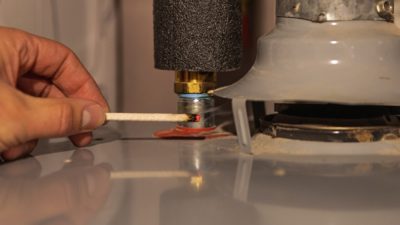With winter behind us, everyone starts thinking about the next season and the hot temperatures coming our way. If you want to reduce energy, save money, and lower your carbon footprint, delaying turning on your air conditioner is a great way to do that. Here are some ways to stay comfortable without running your cooling system yet, and some things to do to prepare for the following year!
Put Up Curtains in Your Home
Studies show that closing your curtains (on sun-facing windows) on summer days is an energy-efficient way to save money while staying cool. According to the U.S. Department of Energy (DOE), curtains “should be hung as close to windows as possible and fall onto a windowsill or floor” to get the most energy efficiency benefits. The amount of protection that you will receive will depend on fabric type and color, but the U.S. DOE states that “medium-colored draperies with white plastic backings can reduce heat gain by 33%.” Other energy-efficient window covering options include insulated cellular shades, window films, awnings, and window quilts. To learn more about these alternative options, go here.
Upgrade Your Insulation
Insulation protects you in the summer, too! Whether you have a newer home or a historic home, insulation upgrades can help you reduce energy and keep the heat outside in the warmer months. When you sign up for a no-cost virtual Home Energy Assessment, a home energy expert will tell you where your home is under-insulated and will make recommendations to get your home up to standards. The sponsors of the Mass Save® program are offering eligible Massachusetts homeowners and renters 75-100% off approved insulation which helps to cover the expense, while the leftover cost will pay for itself in energy savings down the road. If you don’t get this change done in time for spring, it will still keep you comfortable year-round and when next spring rolls around, you won’t have to jump to turn on the AC quite as fast.
Make a Plan for Passive Solar Design
Did you know that materials like concrete, brick, stone, and tile absorb heat from warm air in the house during the summer months? Other design tricks like installing awnings or shutters and strategically placing your landscaping are great ways to complement passive solar design. While this might be more of a dream than a weekend project, it’s fun to think about how you and your family can slowly move to a more energy-efficient future and learn how you can start with small, simple changes.
Air Seal Your Home
According to the ,National Renewable Energy Laboratory (NREL), “air leaks are among the greatest sources of energy loss in a home,” and many homeowners and renters experience the negative effects of air sealing like high energy use, an uncomfortable home, and poor air quality. When the hot air of the summer or spring is entering your home through cracks and crevices, it makes sense why your home heats up so fast. To delay turning on your AC, make sure that common areas like windows, doors, outlets, attic hatches, and recessed lighting aren’t letting unwanted warm air get into your home. The good news is that this is something you can solve at no-cost when you ,get a Home Energy Assessment. The sponsors of the Mass Save program are offering 100% off ,home air sealing which means energy savings for you!
Change the Direction of Your Ceiling Fan
Winter is gone (or at least we hope) so it’s time to change the rotation of your ceiling fan. During the spring and summer, your ceiling fan blades should be set to go in a counterclockwise direction so that it pushes the air down and creates a cool breeze to enjoy. Don’t have a ceiling fan? You should consider getting one to help lower your energy use and increase comfort in all seasons! According to the U.S. DOE, “if you use air conditioning, a ceiling fan will allow you to raise the thermostat setting about 4°F with no reduction in comfort.” So even when you finally turn the AC on, it will help you do that more energy efficiently. Learn more about fans and which ones to buy here.
Get a Home Energy Assessment
The sponsors of the Mass Save program offer eligible Massachusetts homeowners and renters incentives to improve the energy efficiency of their homes and a no-cost Home Energy Assessment is just one of the many things you can take advantage of this season. When you sign up, a home energy expert will assess your home for ways to improve your protection from the outdoors and lower your energy use. You get a custom home energy report with recommendations and results and access to 100% off air sealing, 75%+ off approved insulation, up to $2,750 in HVAC rebates, and the 0% financing Mass Save HEAT Loan. When you ensure that your home is best protected and as energy efficient as it can be, you will be able to feel more comfortable in your home and hopefully not have to turn on your AC as quick when the heat rolls in.
Keep the Air Dry
When the air moving across your body is drier, it helps with the feeling of being hot! Use a dehumidifier to help do the job or even try out some house plants to control the humidity in your home. Did you know that certain types of plants will soak up some of that humidity for you? According to Popular Science, “xerophytes like cacti, aloe, and succulents; “air plants” like bromeliads; and any greenery that doesn’t require frequent watering—get their water from the air around them. If you grow them in windows or window boxes, they’ll sponge up a bit of humidity while blocking some of the sunlight.”
While you’re pulling out all of the stops to delay turning on your air conditioner, it’s a good time to get a tune-up or any preventative maintenance done on your cooling system. Call HomeWorks Energy at (781) 305-3319 to learn about the available maintenance plans and tune-ups and how you can benefit. You can also sign up for a Home Energy Assessment at the same time!
While our minds are thinking about spring and summer and how we can be more energy-efficient, there are plenty of things we can do that will benefit us year-round and make our planet a little greener! Go to the HomeWorks Energy blog to learn more about home energy efficiency topics and get more in-depth content about some of the above tips!





